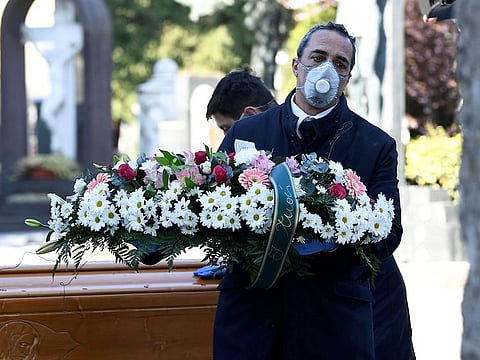Can dead people transmit coronavirus? Is it safe to attend their funeral?
Dubai forensic expert says like all surfaces, body of a deceased can spread the virus

Dubai: Can a person who has died of COVID-19 infect others? The answer to this is a resounding yes.
Dr Nrashant Singh, associate professor and programme leader at the Department of Forensic Sciences at Amity University, Dubai, told Gulf News: “When an individual dies of Covid-19, the virus that is within him remains within as all physiological processes that could account for the spread completely stop. However, the patient’s body surface like his clothes, hands etc where the virus lurks will be very much a source of infection as the virus continues to remain active on inanimate surfaces for several hours.”
Dr Singh said under the circumstances, it is advised that the body be disposed of under controlled conditions, either through burial or cremation as soon as possible.
“In case there is a delay, the body needs to be isolated and stored in minus 10 degrees celsius or less temperature. Although the jury is still out on the impact of the temperature, going by the behaviour of previous viruses, we know that extreme cold or heat will at least denature the virus, if not kill it. This will make it inactive.”
Dr Singh cautioned that the body must not be left out in open.
“Once decomposition sets in, the virus that is within will definitely be exposed and that can be dangerous. It is advisable that a limited number of people have access to the body and they should be careful in its handling,” he advised.
Dr Shyam Chaturvedi, professor of preventive and community medicine and former UNICEF representative from Jaipur, India, specified two major reasons for sparse attendance at funerals of COVID-19 victims.
“The most important is the advisory against any kind of gathering that goes against the principles of social distancing. Then there is a likelihood that some relatives of the victim may also be in incubation period and carry high transmission risks. Thirdly, the dead cannot actively transmit the infection, but the body of the victim is like any other surface. The virus remains active for hours on surfaces and the droplets that may have fallen on the victim’s hand, clothing, face etc are hot spots for transmitting the disease.”
Burial or cremation?
Both methods are recommended under controlled conditions.
“In burial, certain chemicals are added for accelerated decomposition and in cremation, the high temperatures also will help the virus to be contained,” added Dr Singh.
Dr Chaturvedi cited the instance of China where cremations were being carried out for all COVID-19 victims.
“We must emulate the experience of China where mass cremations were carried out,” he said.






